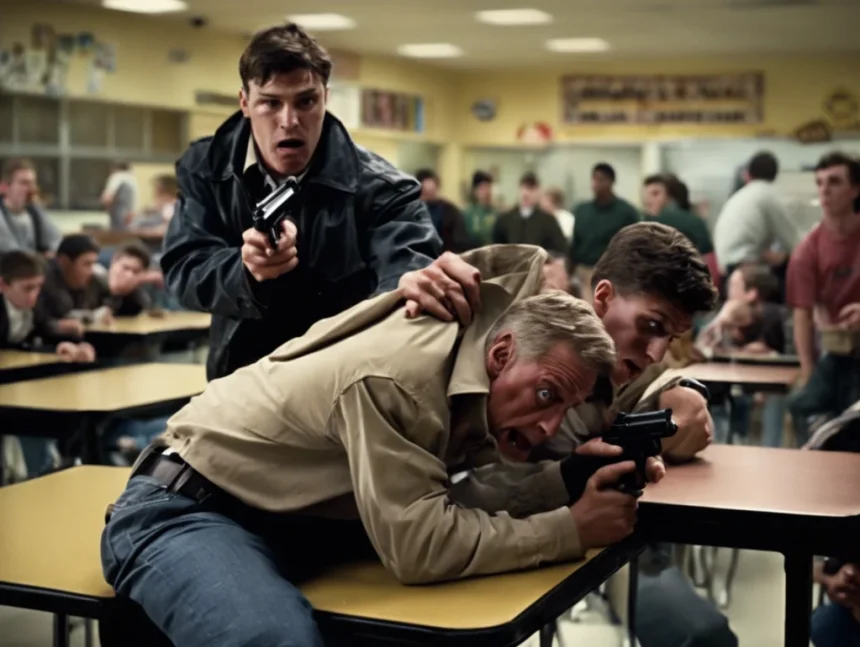Introduction
Frank DiMattina, a former Staten Island caterer and alleged Genovese organized crime associate, faces up to 20 years in prison following his conviction for extortion and firearms charges. Known as “Frankie D” or “Frankie Ariana,” DiMattina’s story is one of intimidation, threats, and violence, centered around a lucrative high school cafeteria contract at St. Joseph by-the-Sea High School. While his defense attorneys vow to appeal, the trial’s outcome paints a damning portrait of a man who preferred coercion to honest competition.

The Crime
At the heart of this case is Walter Bowers, the victim and key witness, who testified that DiMattina produced a gun and threatened him over a bid to cater the school’s lunch program. Bowers alleged that DiMattina demanded he withdraw his bid, stating he would “burn down [Bowers’] bagel stores” if he didn’t comply. A visibly shaken Bowers ultimately backed off, paving the way for another caterer to secure the $165,000 contract.
A Web of Threats and Violence
Prosecutors described DiMattina’s tactics as a hallmark of traditional organized crime. Loretta E. Lynch, U.S. Attorney for the Eastern District of New York, commented, “This case demonstrates organized crime still conducts its business in its traditional way—by relying on threats and violence to intimidate hard-working individuals trying to make a legitimate living.”
DiMattina’s actions extended beyond mere verbal threats. Bowers testified that DiMattina confronted him alongside an associate, further pressuring him to abandon his ambitions for the cafeteria contract. These encounters, marked by aggression and menace, underscored the danger Bowers faced if he resisted.
The Fallout
DiMattina’s conviction includes a firearms charge, which carries a mandatory minimum of five years in prison. The severity of the potential sentence—up to 20 years—reflects the gravity of his crimes. While he was acquitted on charges related to extorting a catering hall, the trial’s revelations about his methods leave little doubt about his culpability in other areas.
The Trial
The trial, presided over by Judge Jack B. Weinstein, unfolded in Brooklyn federal court. Defense attorney John C. Meringolo attempted to undermine Bowers’ credibility, questioning inconsistencies in his testimony and the lack of physical evidence, such as surveillance footage. Despite these efforts, the jury found DiMattina guilty, validating Bowers’ account of events.
A Troubled Relationship
Bowers and DiMattina’s contentious history dates back to early 2010 when Bowers purchased Ariana’s Catering Hall from DiMattina. Their business relationship quickly deteriorated, culminating in mutual civil lawsuits. Bowers accused DiMattina of withholding access to Ariana’s website and burdening him with unpaid violations. Meanwhile, DiMattina’s lawyers claim Bowers still owes $250,000 from the sale and has failed to rename the business as agreed.
Organized Crime Connections
Prosecutors highlighted DiMattina’s alleged ties to the Genovese crime family, one of New York’s most notorious Mafia organizations. These connections add a layer of infamy to his case, painting him as a key player in perpetuating the mob’s reign of terror over legitimate businesses.
The Victim’s Perspective
For Bowers, the ordeal has been harrowing. He described feeling “shaken” and “intimidated” by DiMattina’s threats. His decision to testify—a courageous act given the risks associated with confronting organized crime figures—was instrumental in securing the conviction.
Community Impact
Cases like DiMattina’s underscore the pervasive influence of organized crime on local communities. By using threats and violence to secure contracts, individuals like DiMattina undermine trust in fair competition and harm businesses striving to operate lawfully.
Defense Response
DiMattina’s lawyer expressed disappointment with the verdict, emphasizing the toll on DiMattina’s family. “We’re very upset for his family, his wife, and three children,” Meringolo stated. He vowed to appeal the decision, though the strength of the evidence makes an overturn unlikely.
A Cautionary Tale
Frank DiMattina’s case serves as a stark reminder of the destructive power of greed and the lengths some individuals will go to achieve dominance. His conviction is not just a personal downfall but a victory for those who believe in the rule of law over the rule of fear.
Conclusion
As Frank DiMattina awaits sentencing, his legacy is cemented as a symbol of organized crime’s corrosive impact on society. While his actions have caused significant harm, the justice system’s response demonstrates that such behavior will not go unpunished. For victims like Walter Bowers, the verdict offers a measure of closure, and for the Staten Island community, it serves as a hopeful step toward a future free from the grip of mob influence.







